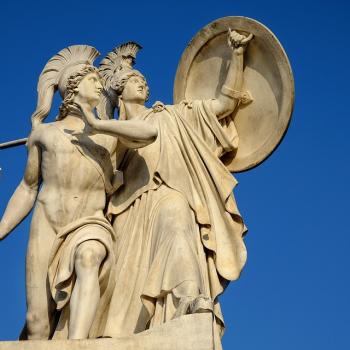I read the Psalms, and I imagine you do too. Many read the Psalms when they wouldn’t touch Leviticus with a ten-foot pole. The Psalms are on the “beloved” list, along with things like the parable of the Good Samaritan and Paul’s ode to love; Ezra, perhaps, along with Obadiah and some other books, on the “really? that’s in the Bible?” list. But even then, some Psalms are more beloved than others. Psalm 23 takes the prize, I imagine. Followed closely by Psalms 103, 139, 51, 46 … Which are your favorites, and why?
The business of “favorite” Psalms is telling. The themes and prayers we gravitate to both shape our vision and reflect it. Athanasius made me think about this. Actually, it wasn’t Athanasius, but “a certain studious old man” to whom he had been talking.
There, at the end of the St. Vladimir’s edition of Athanasius’ great work, On the Incarnation (with a brilliant little essay by C.S. Lewis to introduce it), we find an addendum, “The Letter of St. Athanasius to Marcellinus on the Interpretation of the Psalms.”
The hero of the Arian challenge, the great defender of the Trinity, writes an encouraging and pastoral letter to Marcellinus. He doesn’t, however, give his own counsel, but that of another, a saint who remains anonymous through the long weight of time.
[You are] using the leisure necessitated by your recent illness to study the whole body of the Holy Scriptures and especially the Psalms. Of every one of those, he says, you are trying to grasp the inner force and sense. Splendid! I myself am devoted to the Psalms, as indeed to the whole Bible; and I once talked with a certain studious old man, who had bestowed much labor on the Psalter, and discoursed to me about it with great persuasiveness and charm, expressing himself clearly too, and holding a copy of a it in his hand the while he spoke. So I am going to write down for you the things he said.
Mr. Studious explains the brilliance of the Psalms, listing the ways that the Psalms uniquely capture the many facets of scripture for their own diadem of glory. He points out that each book of the Bible has its own stories and riches. “Each of these books, you see, is like a garden which grows one special kind of fruit; by contrast, the Psalter is a garden which, besides its special fruit, grows also some of those of all the rest.”
The whole Bible, he teaches us, is contained in the Psalms: the creation, the exodus, the early years under the judges, the rule of kings, the prophetic word, and most beautifully, the coming of the Savior. “My old friend made rather a point of this, that the things we find in the Psalms about the Savior are stated in the other books of Scripture too; he stressed the fact that one interpretation is common to them all, and that they have but one voice in the Holy Spirit.”
[An aside: Our ancestors in faith are quite adamant that the whole Bible is about Jesus Christ, from beginning to end. Everything from Genesis-creation to Revelation-culmination tells the story of a God who constantly, consistently pours himself out in and through the Son, most fully and completely in the person of Jesus Christ.]
But the Psalms have their own charisma, their curious role in the life of the believer.
You see, then, that the grace of the one Spirit is common to every writer and all the books of Scripture, and differs in its expression only as need requires and the Spirit wills. Obviously, therefore, the only thing that matters is for each writer to hold fast unyieldingly the grace he personally has received and so fulfill perfectly his individual mission. And among all the books, the Psalter has certainly a very special grace, a choiceness of quality well worthy to be pondered; for, besides the characteristics which it shares with others, it has this peculiar marvel of its own, that within it are represented and portrayed in all their great variety the movements of the human soul. It is like a picture, in which you see yourself portrayed and, seeing, may understand and consequently form yourself upon the pattern given. Elsewhere in the Bible you read only that the Law commands this or that to be done, you listen to the Prophets to learn about the Savior’s coming or you turn to the historical books to learn the doings of the kings and holy men; but in the Psalter, besides all these things, you learn about yourself. You find depicted in it all the movements of your soul, all its changes, its ups and downs, its failures and recoveries. . . . Whether the reader has kept the Law or whether he has broken it, it is his own doings that the Psalms describe; every one is bound to find his very self in them and, be he faithful soul or be he sinner, each reads in them descriptions of himself. (emphasis in the original)
That whole paragraph pokes at me. “The only thing that matters is for each writer to hold fast unyieldingly the grace he personally has received and so fulfill perfectly his individual mission.” Geez Louise. I’m working on that. My grace, my mission, my voice is not Anne Lamott’s raw honesty. It is not Ann Voskamp’s lyrical vulnerability. It is not N.T. Wright’s scholarly passion, Beth Moore’s perky eloquence, or Francis Chan’s hip persuasion. I don’t know what it is. I’m stuck, apparently, for now, with what it is not.
But then, Mr. Studious goes on: “It is like a picture, in which you see yourself portrayed and, seeing, may understand and consequently form yourself upon the pattern given. . . . In the Psalter, you learn about yourself. You find depicted it in all the movements of your soul, all its changes, its ups and downs, its failures and recoveries…” A mirror, in which objects are closer than they appear. Listing my favorite Psalms, and why—how they voice me, reveal me, declare me—is perhaps an exercise in truth-telling, a magnifying mirror. Listing my least favorite Psalms might be even more telling. Channeling a nearly two-millennia echo from Athanasius and Mr. Studious, I invite you to peer into the mirror for yourself. What do you see?
Photo: Mr. Physics, Flickr C.C.












